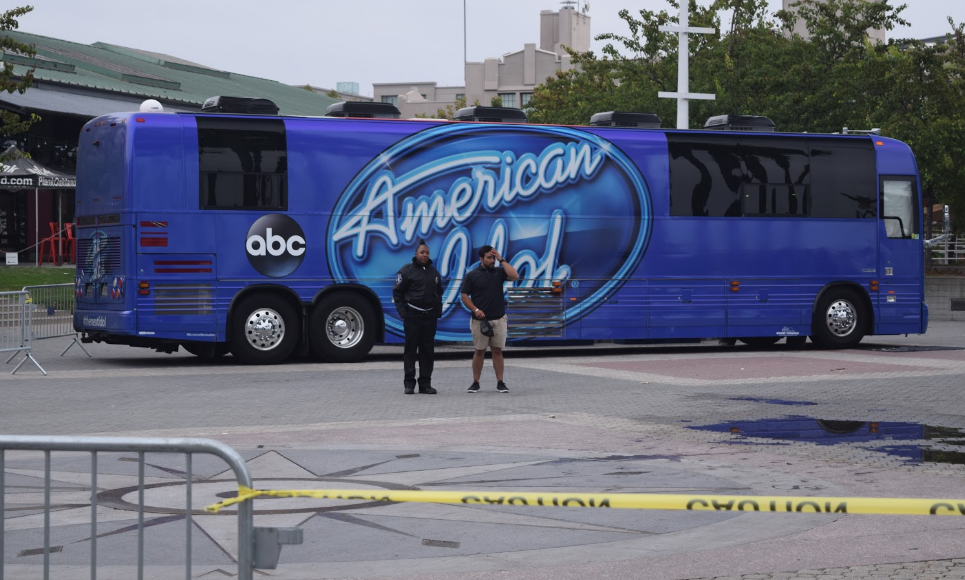This piece was inspired by an episode of The Cooler, KQED’s weekly pop culture podcast. Give it a listen!
Who Tries Out for 'American Idol' in 2017? I Went to the Oakland Auditions to Find Out
Jack London Square in Oakland is overcast and chilly at 7:30 am on the morning of open auditions for the newly-resurrected American Idol -- but of course, those in this open-air line have been here for hours already. Several members of the Oakland Police Department are on hand in the background, standing by their squad car and not doing much at all. “This is exciting, huh?” one officer said to me, and he was being serious.
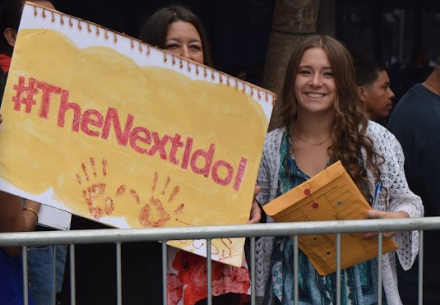
It’s the first time that Idol has held auditions in Oakland, rather than San Francisco just across the bay, but the audition rules remain the same: Per the online registration form, applicants must be aged between 15 and 28. The atmosphere is, therefore, as excitable and jittery as you’d expect a gathering of hundreds of 15 to 28-year-olds waiting to appear on television to be.
It’s a diverse crowd, and the dress code ranges from casual sweats right up to groomed, glossy Instagram Model. Every time the Idol cameras appear to pick out interview subjects in line, there’s a palpable surge of energy. People suddenly strike up a song in line and everyone joins in. Every so often, you hear someone yelling out their social media handles, to nobody in particular.
No matter how many times you’ve seen footage of the Idol juggernaut coming to a particular city -- the big blue tour bus, the triple-speed footage gliding down the long, snaking line of hopefuls -- it’s still odd seeing it in the flesh. As with all peeks behind the TV curtain, there’s an element of anticlimax, of diminished scale, which the outdoor setting does nothing to assuage. The line is long, yes, but not the crazy mass I’d been anticipating. (Later, an Idol representative will politely decline my emailed request to know just how many people showed up for the Oakland auditions, saying that’s not information they give out.)
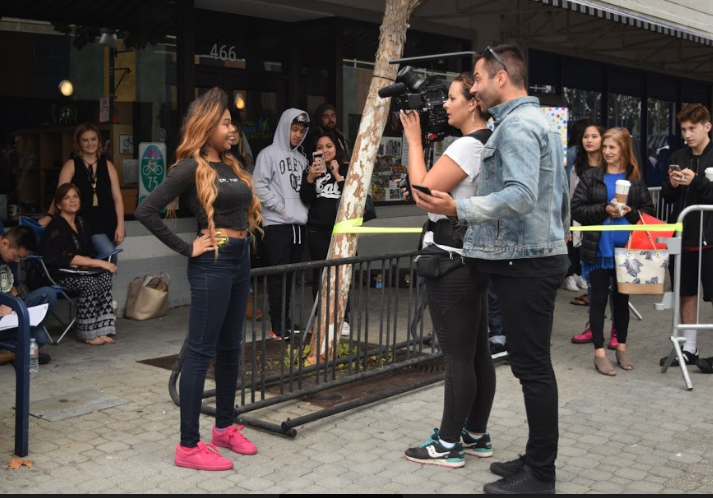
The biggest surprise, however, comes half an hour in, as I’m chatting with a gaggle of hopefuls and a very loud sound suddenly interrupts us. It’s the clatter of the Amtrak train, passing through on the tracks that are only steps from where we’re standing in Jack London Square. It’s so loud that I have to ask the girl I'm interviewing to pause a moment while it passes, and then I realize: American Idol is filming its audition show next to a busy train track.
2016 was meant to be American Idol’s last year, after 15 seasons on Fox. No less than Barack Obama appeared on what was billed as the farewell finale, praising the show for having “transformed television.” Goodbyes were said, Trent Harmon was crowned the new Idol, and that was that... until barely a month later, ABC announced it would be resurrecting the show on its network. In a statement, ABC President Channing Dungey called the show a "pop-culture staple that left the air too soon.”
The second part may be up for debate, but there's no disputing the first. For many, it feels like Idol has always been on TV, but it's easy to forget just how all-pervasive and influential it really was and is, in the way that it normalized this kind of competition on TV.
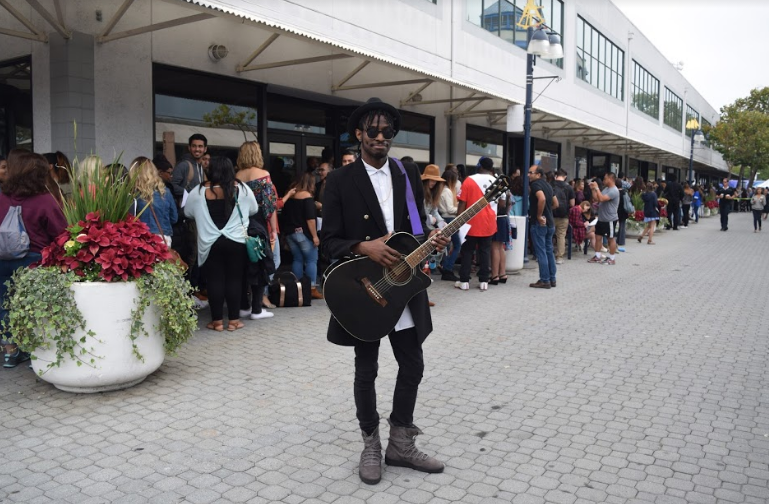
Towards the end, Idol’s ratings were a shadow of what they were in the show’s heyday. Even the young people now standing in line in Oakland to pin their fortune on the show stopped watching. So often, when I asked a hopeful if they liked Idol, they'd say, "Yeah, I used to watch it when I was a kid."
“So, like, last month then?”, I want to tease them every time.
A show like American Idol has a set recipe, and a key ingredient is a person’s story. Talent is powerful, but even more so when its owner has something that makes them different.
The unifying theme of these stories is, usually, struggle: A difficult past, a family breakup, a tragedy lived through and overcome, with music almost always as the medicine. These folks in the line know this, and they’ve come ready to tell the world -- the producers, the cameras, me. When the auditionees I speak to quickly volunteer details of the traumatic events in their lives, it's with readiness, a degree of preparedness, and a total lack of self-consciousness. They know this honesty, or the TV version of it, is part of the deal.
In any other context, if people leaped straight to emotional third base in this way, it would be startling. But in that line -- with the big blue Idol bus bearing down on us -- revealing one's story and a difficult past straight away, with virtually no prompting, is par for the course.
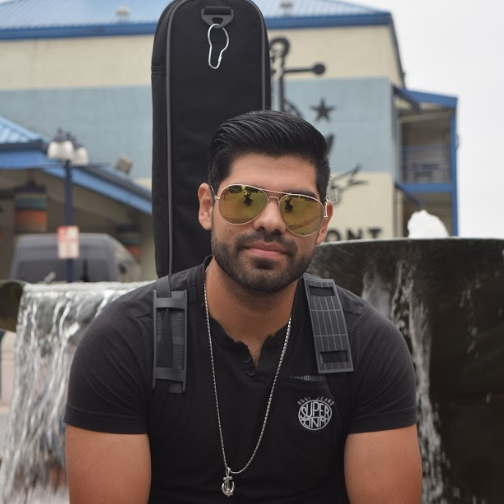
I get to chatting with Gabriel, a young man with aviator sunglasses and a guitar on his back, while he’s taking a smoking break from the intensity of the line. He’s road-tripped here from Vancouver, and my questions about his Idol motivations are met with an answer that delves immediately into a troubled past. He reached, he tells me, “a point where I was about to commit suicide” -- struggles which halted his previous foray into reality TV. He got through to the second round of The Voice, but “some things I was going through” meant he couldn’t continue. Winning Idol, he says, “would change my life because I have a daughter, and I want to give her everything I could give her. The best future I can.”
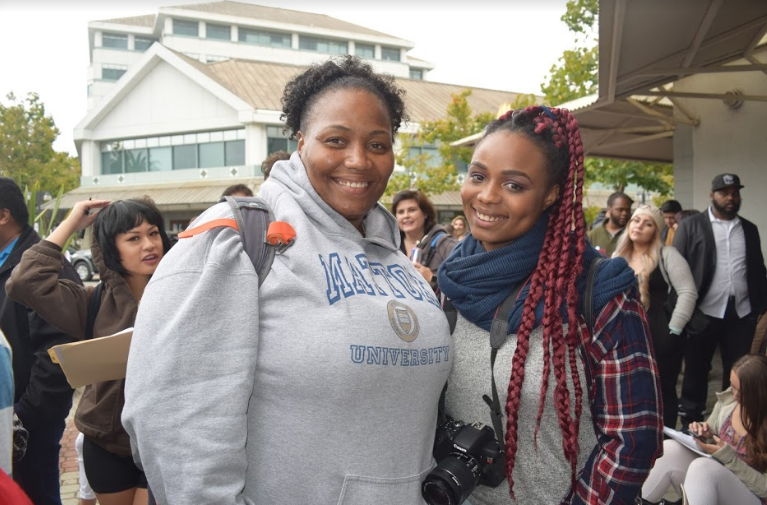
It’s not just potential Idols who were prepared to share their backstories, but their families and supporters too. Standing in line, Alisha from Pittsburg told me how her Idol hopeful daughter Courtney’s “really low, raspy kind of voice” would set her apart (“you don’t see that too much”). Then, she spoke of her husband’s death. Courtney appearing on the show, she said, would be “a tribute to him too -- showing her daddy in heaven that ‘I’m still doing it, daddy. This is for you.’ Life is so precious and so short.” In the American Idol line, emotion and history are always right near the surface.
The audition hashtag, as proclaimed on the Idol bus, is #thennextidol -- a phrase that practically encourages those in line to forget about the journey and skip straight to the destination.
Talking to waiting hopefuls, it becomes clear that years of watching Idol and shows like it has trained people to already see themselves as others will: As a package, a product even, to be viewed and assessed. When they talk about themselves and their dream, they're already seeing themselves as they imagine an audience -- and their intermediaries, the Idol producers -- might. It’s like the male gaze, rewritten as the reality TV gaze.
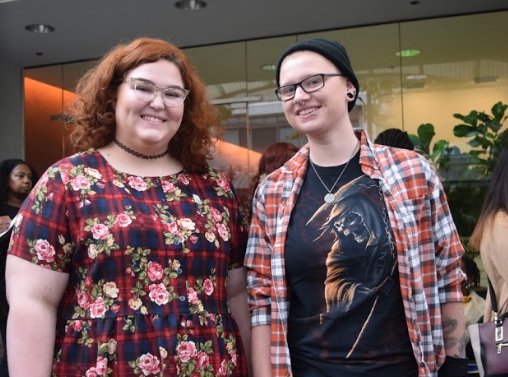
Elena, 19, from Gilroy, already had an on-screen analogue for herself in mind. “I always think I am literally [Hairspray’s] Tracey Turnblad. So everyone would think ‘Oh, it’s that big girl from high school that no-one really looked at, but she’s a star now!’”
Her friend Jace, 20, a psychology student from Fairfield, was imagining herself cast on the show in the role of the quirky outlier. “I’m a little bit weird so they’d look at it, like, who’s this strange human?” She then added: “It’s pretty much the expected reaction when people see me in general.”
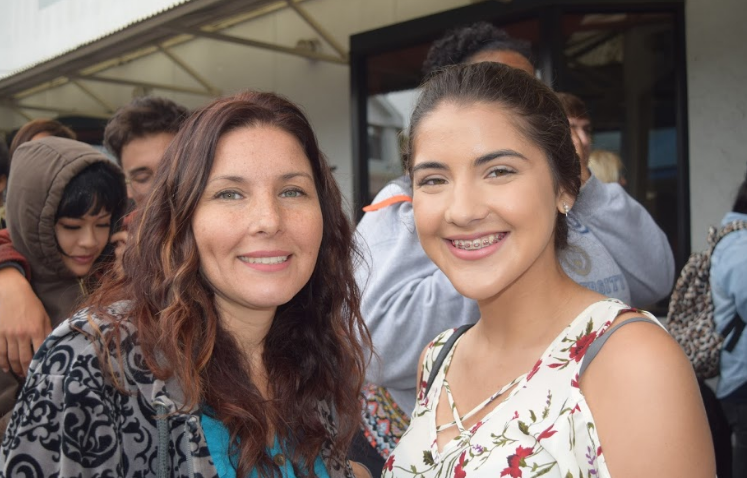
This hyper-self-awareness is brought into sharp relief when a woman actively approaches me as I'm typing notes on my phone, telling me that if I'm looking for a good story, her 16-year-old daughter Adriana is it. They're a military family, she explains, and have overcome the struggles that entails: “I just thought it was a good story to tell. She’s traveled all over the United States with us and she’s a military child and she’s got a story to tell.”
When I ask Adriana herself, she tells me her background has “made me who I am,” but that she feels like “I haven’t heard the ‘military brat’ story. I haven’t heard the struggles that me and my friends go through. I feel like a lot of people should know."
It's becoming clear that adjacent to the fame and the acclaim and the record deal, the young people here genuinely view Idol as their opportunity to become an ambassador for something. Whenever I ask how they predict the audience at home might perceive them, the response is always in these terms: "I want to be seen as an example." It’s like mere talent is not enough -- to truly be #thenextidol, one needs an almost remedial power to reach out through the television screen and touch the viewer’s very life in some meaningful way. They don’t want to just be some kid’s new favorite singer. They really do want to be their idol.
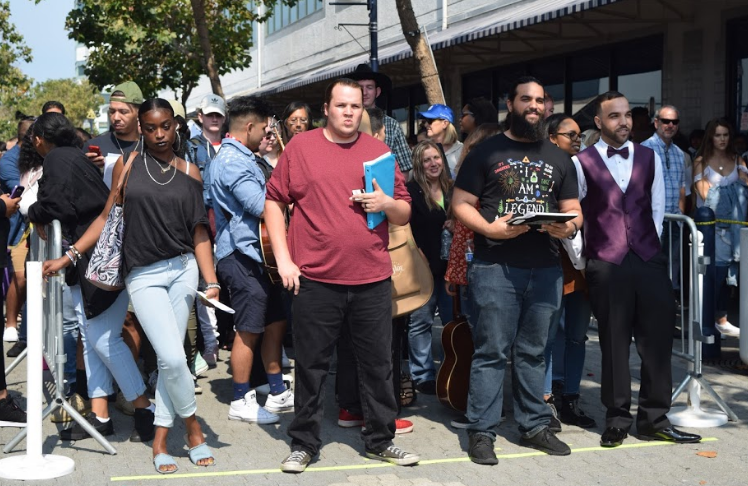
This drive is most striking in Tito, the 27-year-old successful auditionee who I've noticed several times earlier today owing to the viola he's carrying with him everywhere. Like everyone else I spoke to, Tito was disarmingly frank about his past struggles. Upon moving to LA from San Francisco to pursue his entertainment dreams -- against the wishes of his evangelical Christian parents, immigrants from El Salvador -- he wound up “homeless for a little bit.” Jobless, he "started doing some dancing gigs, a little bit of go-go dancing -- nothing wrong with that, but I had to live in my car for a little bit, and I picked myself up and here I am.” (The entire time Tito is telling me this, a woman is singing very soulfully and incredibly loudly for a producer behind us.)
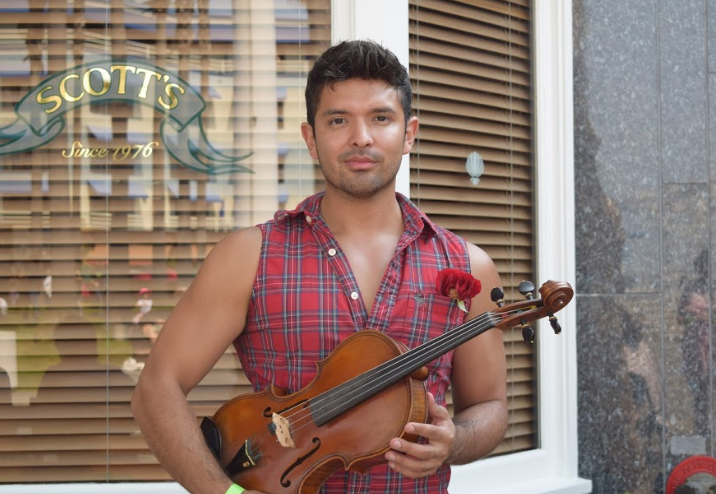
Tito tells me he wants his hoped-for appearance on Idol to be as an advocate for homeless youth. “To be a Latin male, an ex-homeless person, I think that would be a good representation of what you can do it you really set your mind to it.” He hopes that “my voice and my story can be a voice for those who don’t have one. There’s a lot of Latin immigrants that don’t have that confidence to speak out for themselves, especially with our President in office,” he says. When I ask him if he sees any potential appearance on Idol as a political act, he tells me that “it's almost like a ‘f*ck you’ to Donald Trump. I’m Latino, I’m reaching for my dreams in this country."
Aren't you concerned that the reality TV juggernaut will edit out -- or at least gloss over -- all your politics and your passion, I ask? Like everyone I ask this question, Tito is sunnily pragmatic. “If I sign a contract, I sign a contract… As long as I get my message across, I’ve done my job, as a performer and as a citizen.”
23-year-old professional musician Mandy, who was visibly vibrating with adrenaline after making it to the next round, was similarly bullish. “[I’ll] be me and if they don’t like it, then it’s okay. It’s not gonna stop me playing music.” Being edited, she said, was “not the end of the world.”
Back in the line, I flag down Robert, who, despite the guitar he's holding, isn’t here to audition but to support his girlfriend Desiry. (“She sings really great, she’s versatile, and yeah -- she’s gorgeous.”) Robert foresaw some startlingly logistical improvements to their life together coming from Idol. With him working graveyard shifts at a bank, and her working retail all day, their day/night jobs afforded them little time to collaborate musically. “But if we were to actually win this, it would be a lot easier to connect and do things we love together.” (He also, of course, saw potential ambassadorship in Desiry, predicting that viewers might “want to follow in her footsteps and be a better them.”)
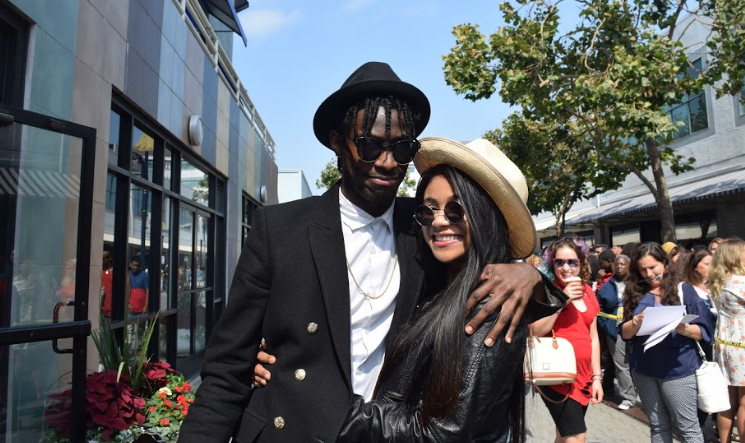
Nobody I spoke with had any problems with the idea of leaving their hometown and their community if they were to become #thenextidol. In fact, it seemed part of the appeal for many like Courtney, the young woman auditioning in memory of her father, who said she was “definitely ready to bounce” from Pittsburg. “I think everybody there is ready to get out,” she added.
It struck me how this seeming familiarity with the machinery of reality TV, and a person's place in it, was paired with a startling lack of concern about that machinery. I repeatedly ask auditionees how this show could alter their life, and the answer is always the same: It would be amazing, positive, incredible. Nobody seems to perceive any downsides to that level of public scrutiny -- or if they do, they’re not talking to me about them.
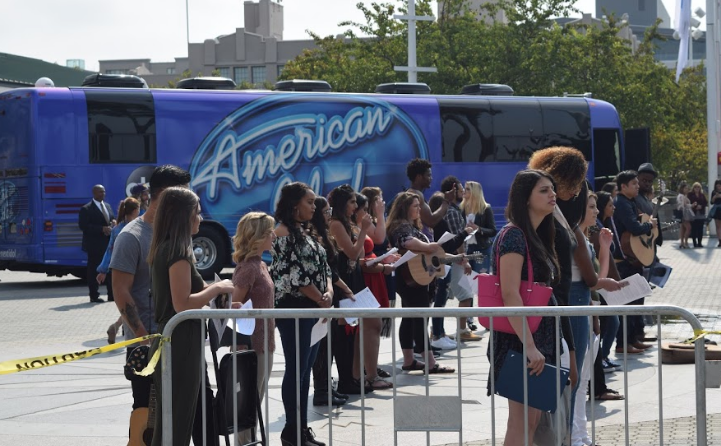
But why would they? They're in line to be #thenextidol, and #thenextidol is relentlessly, almost oppressively positive about everyone and everything. Music is amazing, this opportunity is amazing, the fellow auditionees are amazing. Even the rejected performers stay upbeat: “I absolutely sang my heart out. I felt so much release,” 16-year-old Hayley told me, moments after being turned down by the producers after her performance of "Hallelujah." She was smiling, even though she'd obviously been crying earlier. "There’s always next year.”
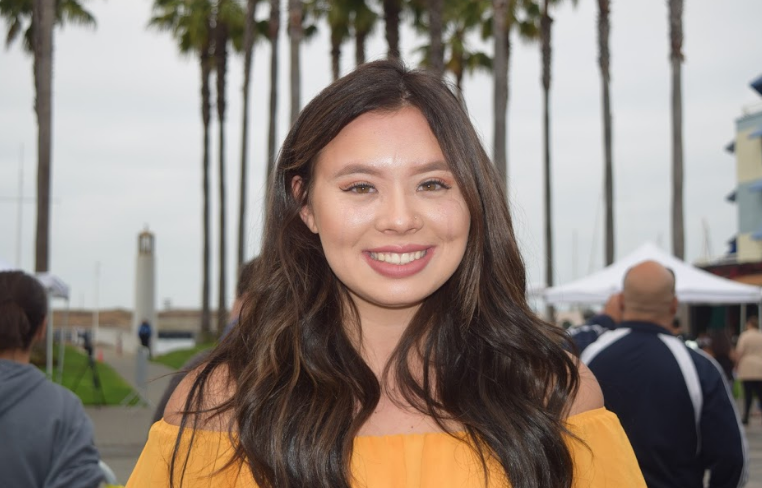
Given it’s a large crowd of teens and young adults -- a large portion of whom are destined to be told that their talent just isn't evident enough -- this lack of visible despondency at rejection is startling. The auditions themselves -- performed for one of several Idol producers sitting at a row of desks beneath the palm trees of Jack London Square -- are all conducted in full view of not only the line of waiting auditionees but also an assembled crowd of supporters, onlookers, and random folks stopping to rubberneck. The “no” is, therefore, very evident and crazily public, yet these young people simply smile tightly and briskly walk back to the barriers. Because of their age, most of them are going into the arms of their waiting family.
People here see my camera and beam at me, like a switch has been flipped -- they're being seen and that's great. That, after all, is what they're here for. Later that night, going through my photos, I’m struck by just how many of the people in the background, behind the actual subject, are posing too.
But why, in the age of YouTube, would any young person see such a relic of the reality TV era as their preferred ticket to stardom? Hayley, the teen who didn’t make the cut, explains that it’s “just a lot easier to go through American Idol. If you make it, you automatically know these producers, and record labels will look at you. With YouTube, it’s a little bit slower; you really have to promote yourself." She might, she said, now try out for The X Factor, or America’s Got Talent.
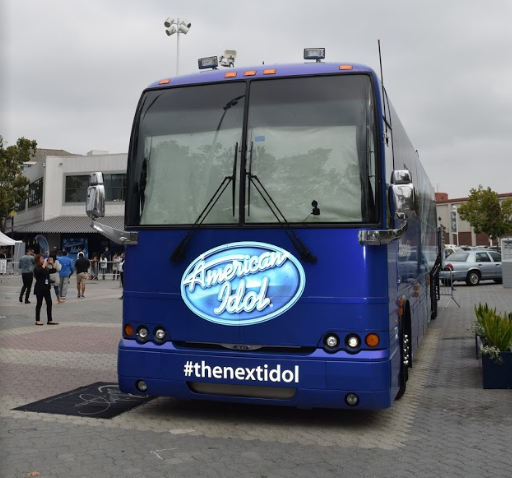
On shows like Idol, you’ll often hear auditionees say it's their “last chance” to make it in this business, or their “only hope.” But honestly, watching them seem to shrug off rejection, it became evident that most of those in attendance were very aware of their other options in life. When I asked the hopefuls in the line about their plan B if Idol didn't work out, they were always breezy -- they'd keep on hustling, continue with school, keep putting their stuff on YouTube, audition for another reality show. When I caught up with Robert’s girlfriend Desiry -- the one who was actually here to audition -- her attitude to the possibility of rejection was so calmly pragmatic, and (at the risk of sounding condescending here) mature. “[I’ll just] continue to get better!”, she said. “Constructive criticism is the only way forward. If you can’t take that, there’s no way that you can really improve in this world.”
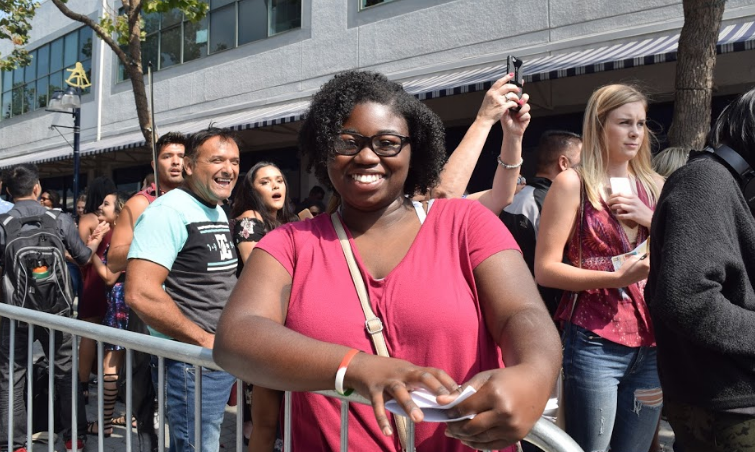
For many others I spoke with, Idol was just a moonshot while they were pursuing various other paths. Monica, 19, from Richmond, who says she’d be “shocked and surprised” if she made the cut today, is about to start her junior year at medical school in a couple of days. (“I come from a city that doesn’t have the best reputation, but I heard a quote once that said ‘diamonds are created through pressure,” she tells me, giggling.)
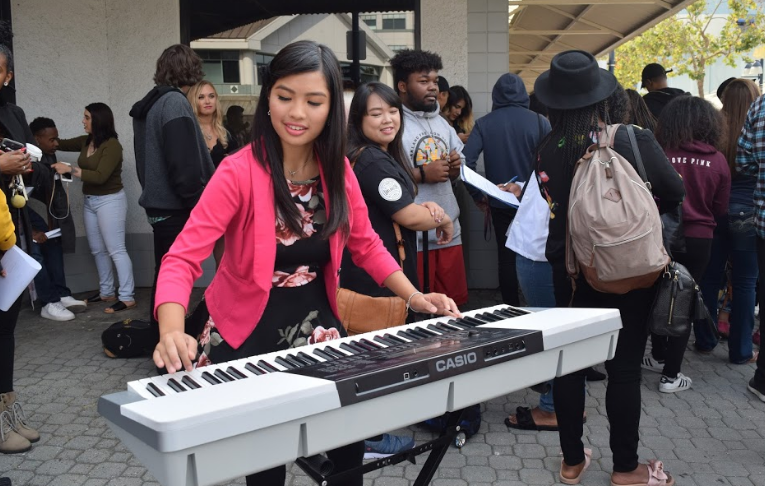
Further down the line, 15-year-old Kirsten from Benicia -- pink skirt suit, bright blue contact lenses, not much taller than the chunky free-standing keyboard she’s brought along -- talks to me about her dreams of becoming a software engineer with as much passion as she does about her desire to feature on American Idol. She doesn’t think appearing on -- or even winning -- the show will affect that part of her life. Kirsten performs a yowling version of ‘Great Balls of Fire’ for my microphone, while people around fall silent and listen, but is even more excitable when we discuss her ambitions to attend UC Irvine and work for Disney. (“I hear that Disney and other tech companies hire straight out of schools around the area,” she informs me with authority.)
Asking Kirsten whether she sees a contradiction in her twin dreams of coding excellence and reality TV fame is a telling moment. She says she doesn’t understand the question, so I think I’ve expressed myself badly and repeat myself, this time also asking her if one seems more “shallow” than the other. She tells me confidently that “if you’re in it for the right reasons, there’s no reason for it to be shallow.”
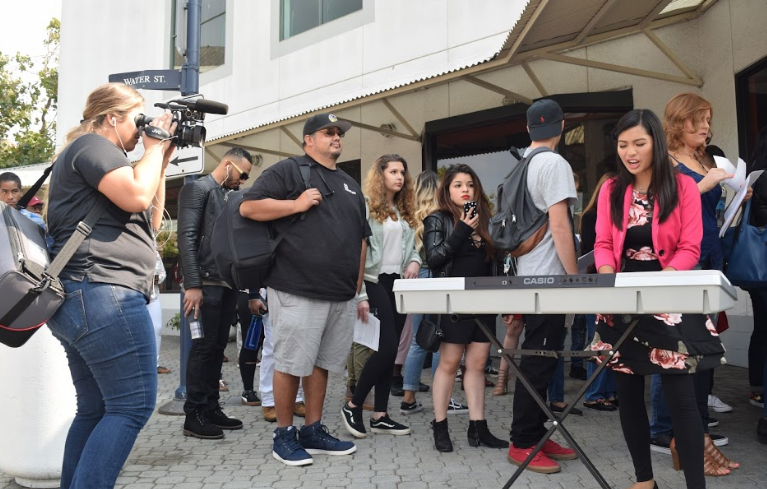
I realize suddenly that the question only really makes sense to someone my age or older, who can remember a time before Idol and its ilk. We’re the ones who tsk-tsk about “short cuts to fame,” and roll our eyes at this new way of making it big. For people Kirsten’s age, reality TV and YouTube stardom have always been an option. It’s been on the table -- close for some, tantalizingly out of reach for others -- and physically on their screens for as long as they can remember. So why would there be any contradiction between the things they want, when they’re all dreams in the same life? ”There’s a lot of great artists I look up to like Aretha Franklin or Bruno Mars,” she tells me. There’s no contradiction.
These open-air auditions are so transparent -- at least in terms of what you can see and hear -- that you can see auditionees in the line for the producer’s desk getting visibly psyched out by a particularly proficient performance ahead. Yet the jittery enthusiasm is infectious, and makes cynicism hard to maintain, even for uninvolved onlookers.
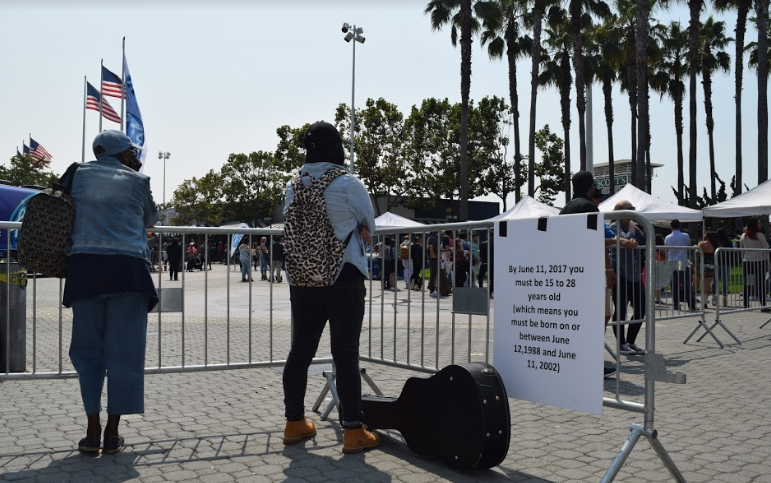
Hillary, a trained classical singer in her late twenties who's stopped to watch the scene, is far from dismissive -- or even just a little skeptical -- of this parade of mostly-untrained young singers. She talks with an unexpected pride about what she sees as their openness and their creative ambition. “They’re so happy and so open to express themselves and their talent and what they truly believe to be true. And I think that’s just a marvelous thing.” Doesn’t the professionally-trained part of her rankle at amateur singers thinking they’re good enough to vault straight to the big leagues, I ask? Not at all, she replies. “They’re pop singers so they sing with a pop sound. They move their jaws around a lot… it’s a different type of singing. It’s people letting their souls out and singing popular songs.”
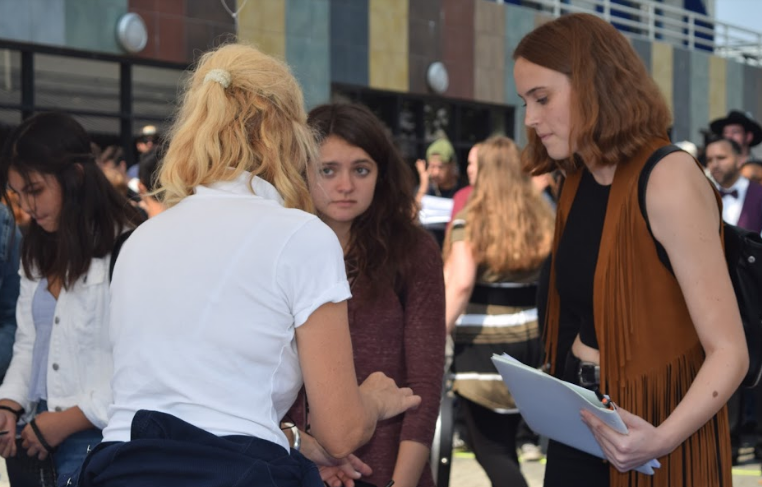
Watching a frighteningly good-looking young man singing Hozier's "Take Me to Church" for the producers’ cameras with a stop-start phrasing that's entirely absent from the original, I think of how it’s become a tired cliche to point out that voices like Janis Joplin's or Tom Waits’ would never make it through the Idol gates. But witnessing the auditions as an unedited procession, it’s staggering to see and hear just how homogenized the sound actually is. Everybody really does sound the same: soulful, soaring, emotive, vibrato-ing wildly. This is Good Singing, and the general idea, it seems, is to opt for these big songs that allow an opportunity to glide up the octave.
On the set, I ask one of Idol’s casting producers -- Nancy Yearing, who’s worked on the show for nine seasons -- about these audition trends. Yes, everyone basically sings the same songs, she says. “Lot of Alicia Keys; "At Last"; "House of the Rising Sun" -- amazing songs, but they’ve just been overdone. It seems like everyone comes in with the same 50.” She wonders whether they’re getting them “from their vocal coaches.”
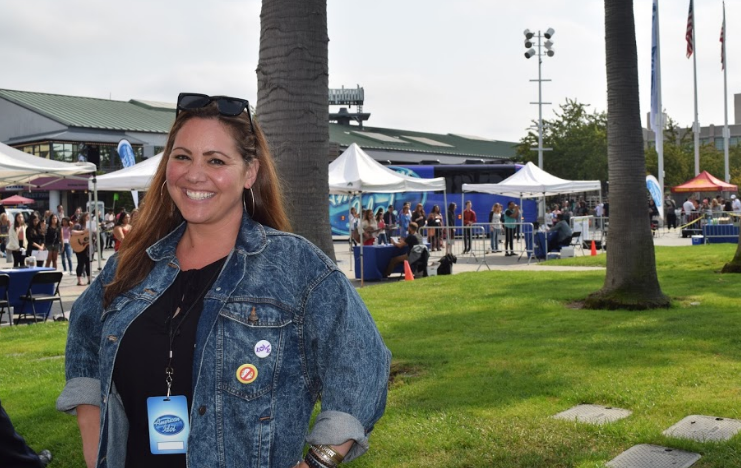
I then ask Nancy if they were aware their Oakland set was essentially on top of an Amtrak route. She tells me no, they only found out the morning they arrived to set up, but that she’s finding workarounds. “I try and time it. I have a good view of when the gates come down.” It might also be an unexpected bonus, she suggests, for assessing an auditionee’s mettle. “If it happens in the middle of someone singing, in some way it’s a good test -- what can you sing through?” She also tells me she doesn’t “really know” the reasoning for the show’s upper age limit (28), and is firm when I ask if she’s concerned she’s missing out on some really top-notch 29-year-old talent. There are, Nancy says, “lots of avenues for talent. If someone’s going to be successful, they’re going to be successful.”
Nancy tells me the show's producers are excited to be auditioning in Oakland this year rather than San Francisco. Not just because of the “coolness” of this “up-and-coming city,” and “trying to change up where we normally go,” but also because of the new variety of try-outs she thinks will now be able to participate -- as if those cities were hundreds of miles from each other, rather than a Bay Bridge ride or a 10 minute BART train.
And the lack of familiarity shows. I keep thinking: This is a tightly-controlled, multi-million-dollar television juggernaut, now in its 15th year. And they didn't know their open air film set was next to a busy railway line. Was the City of Oakland just so thrilled to have Idol in town that it never came up? Did nobody scout out what is an entirely new location for this roadshow? I can't help but wonder how much cheaper hiring out Jack London Square is for Idol’s new network ABC than a similar venue in New York City, or L.A. or San Francisco (none of which are on the 19-city tour list).
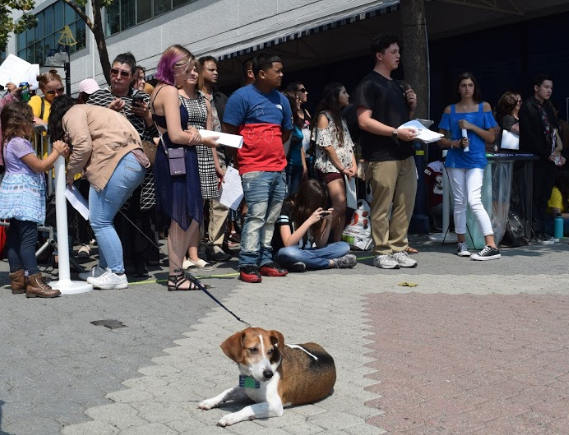
But if anybody here shares my suspicions, they’re not telling me. Everyone in line seems thrilled that the Idol bus has chosen Oakland today, almost always citing the diversity they see in the cohort. (Tito, with his viola, tells me he actually sees way more diversity today than he did when auditioning for The Voice. “It’s a different crowd of people.”)
On my way out, I ask one teenager dressed in a Wonder Woman costume about the strategy behind her outfit. Anything to stand out, she replied -- already seeing herself as the producers, and the viewers would -- and indeed, she got past the producer’s audition desk.
Walking back past the line, which is now dwindling, I think of the young woman I heard earlier in a nearby coffee shop, telling someone on the other end of the phone that "I don't know whether to chose something that shows off my talent or something that they want." In 2017, the American Idol hopefuls here in Oakland truly know the difference.
To hear the actual voices of the auditionees I talked to and more, give this episode of The Cooler a listen:
